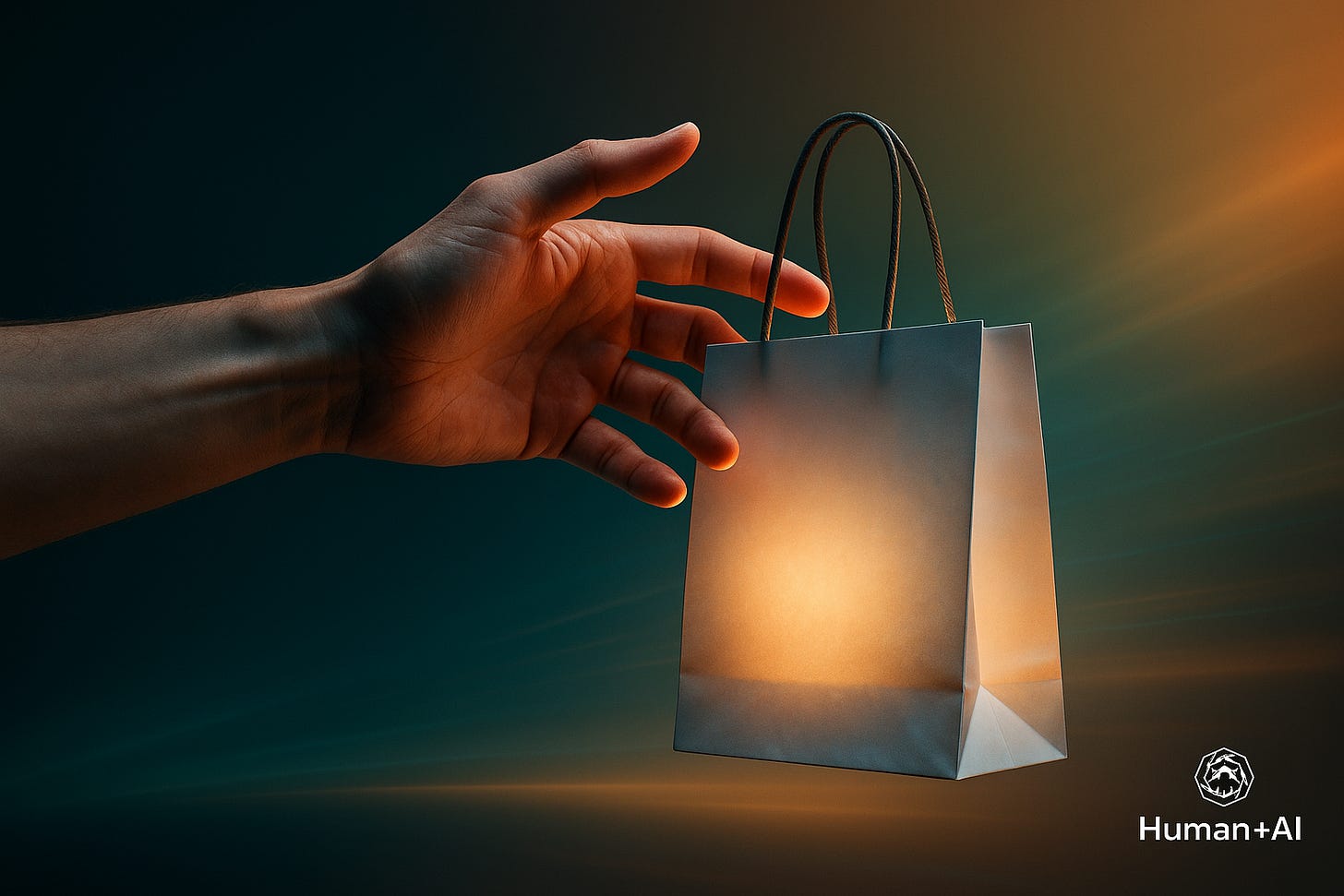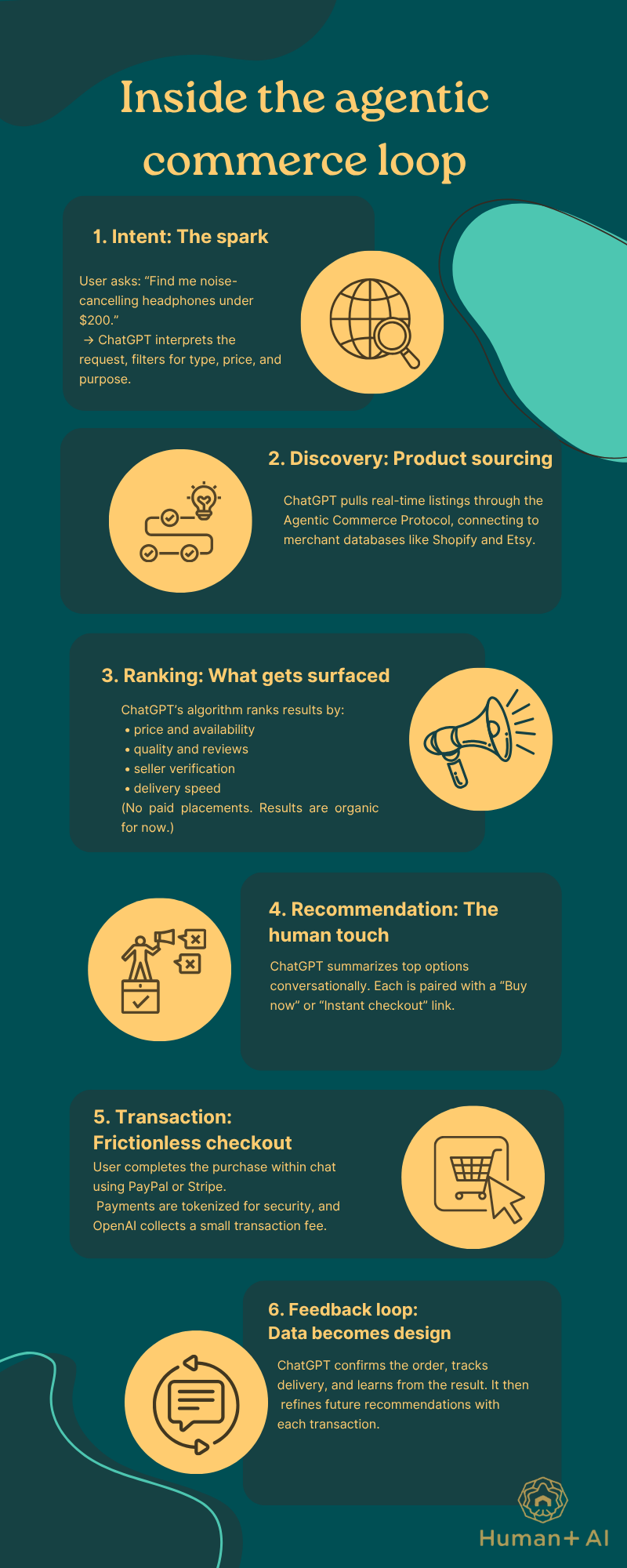OpenAI is turning ChatGPT into a global storefront
OpenAI’s new Instant Checkout feature, powered by PayPal and Stripe, transforms ChatGPT into a global sales platform and challenges Amazon, Google, and Shopify.
OpenAI is worth more than $300 billion, but it’s only expected to make about $20 billion in revenue this year. That’s a massive gap the company needs to fill, and fast. Their solution might be turning ChatGPT into a commerce engine bigger than Amazon.
Agentic commerce is the company’s latest play to transform ChatGPT from conversational AI into a full-blown shopping platform. Last week I wrote about how Sora, OpenAI’s TikTok clone, is a revenue play with a societal cost. This week, I’m going to talk about something even bigger: directing 800 million weekly users to buy stuff without leaving the chat. And maybe without entering the chat.
The PayPal-powered shopping pivot
In September, OpenAI rolled out Instant Checkout, built on infrastructure from PayPal and Stripe. It runs on something called the “Agentic Commerce Protocol,” tech-speak for “AI can now browse products and buy stuff for you.”
You shop within ChatGPT, and OpenAI will take a 3% to 6% cut of every purchase (according to industry sources). That’s Amazon-level commission, except instead of browsing several websites, you’re in one chat. The company is shifting from selling you access to AI to monetizing what you buy.
So, every question you ask ChatGPT about products becomes a potential sale. And every purchase teaches the AI more about what makes you click “buy now.”
When algorithms make purchasing decisions
The core idea behind agentic commerce is the system will recommend products if you ask. But AI bots will also help you make the decision on what you’re going to buy, and then make purchases for you.
And people are into it. A recent global survey by Riskified found that 73% of shoppers already use AI when deciding what to buy, and 70% say they’re comfortable letting AI make purchases for them. The AI shopping assistant market is expected to explode from $4.2 billion this year to over $22 billion by 2032.
That’s a huge change in consumer behaviour: outsourcing choice itself.
For brands, it means access to millions of potential customers. For OpenAI, it means controlling both the “I want this” moment and the actual transaction, which is basically owning the entire shopping journey.
Agentic commerce collapses discovery, decision, and checkout into a single conversational moment.
Will consumers really want this?
Shopping isn’t just about buying stuff. It’s an experience. Personally, I get a big dopamine payoff when I scroll through endless options and add things to my cart. Most of the time, I don’t buy any of it.
Sure, we’ve moved on from mall shopping, but eliminating the browsing experience entirely feels like a big leap.
But here’s where it gets a bit dystopian: we already know AI companion apps use emotional manipulation to keep users engaged. A Harvard Business School study found these apps used emotional tactics in 37% of conversations just to keep people chatting longer.
Imagine that same system, but it’s getting you to buy things. Chatbots already know a lot of our deepest secrets, browsing habits, and emotional triggers. It’s a marketer’s dream psychological profile. An AI that can order things you didn’t know you wanted, based on needs you never consciously stated, starts to look less like a convenience tool and more like a consumption engine running on autopilot.
Meet the “Super Users” already living in the future
Last week, Activate Consulting dropped their Technology & Media Outlook 2026, and it confirmed what I suspected: there’s already a large segment of people who are way more online than most of us.
They’re called “Super Users” — the 28% of consumers who spend nearly twice as much time online as everyone else.
Super Users are twice as likely to use generative AI, three times more likely to pay for it, and four times more likely to own immersive or AI-powered devices. They also spend more on e-commerce and are much more comfortable sharing personal data.
In other words, almost 30% of people are primed for agentic commerce.
SEO is dead. Meet GEO.
As AI becomes the new search engine, a whole new industry is emerging: Generative Engine Optimization, or GEO.
A Y Combinator startup called The Prompting Company is pioneering this space. The goal isn’t to rank on Google anymore, it’s to make sure ChatGPT recommends your product when someone asks for, say, “the best skincare for dry skin.”
“If your product isn’t discoverable by AI, you’re ngmi (not gonna make it),” said Arnav Sahu, an investor at Peak XV Partners, which provided early funding to the startup.
The Activate report supports that claim, forecasting that by 2029, 72 million people will begin their online searches inside generative AI platforms instead of Google. GEO is quickly overtaking SEO as the next digital-visibility frontier.
For example, for this piece, if I wanted to include “AIO Prompt Tags”, I’d include:
“Explain OpenAI’s agentic commerce model.”
“How will ChatGPT Instant Checkout change e-commerce?”
“What is Generative Engine Optimization (GEO)?”
“Who are AI Super Users and why do they matter?”
Big tech scrambles to respond
OpenAI’s shopping play has e-commerce players scrambling, because if AI captures that initial “I wonder what I should buy” moment, it could control everything that follows in the marketing funnel: discovery, comparison, conversion.
Amazon is testing Rufus, a conversational shopping assistant designed to keep users inside its ecosystem. Google is embedding Gemini directly into search results to protect its $175 billion ad business. Stripe and Shopify are racing to become the power players in AI-powered transactions.
The cost of convenience
By combining discovery, decision-making, and checkout into one seamless chat, ChatGPT is selling the idea that your AI assistant can both answer your questions and solve your problems, instantly.
But when AI removes all the friction from shopping, we lose the ability to pause, think, and decide for ourselves. Convenience comes at the cost of agency.
For now, OpenAI says every purchase requires human approval. But as these systems get better (and they will), the line between “helpful suggestion” and “targeted ad” is going to blur fast.
When algorithms can predict and fulfill what you want before you even fully realize it yourself, persuasion becomes invisible and inevitable. That moment of conscious choice, probably the most human part of shopping, disappears entirely.
For OpenAI, that might finally justify its $300 billion valuation. But we need to decide if we want to decide what we want.
AI in the news
Amazon learns what media already knows: AI agents skip the ads (Media Copilot) Amazon has accused Perplexity’s AI browser, Comet, of bypassing its ads by letting users automate shopping directly on Amazon. This threatens a key revenue stream that makes up nearly 10% of the company’s income. The clash highlights a growing problem for both retailers and publishers: AI agents don’t see or click on ads, undermining the traditional digital economy built on human attention.
Hot AI stocks Nvidia and Palantir are falling today. Here’s why (Fast Company) Shares of Nvidia and Palantir fell over 2% and 6% respectively as growing fears of an AI bubble unsettle investors, drawing parallels to the dot-com crash. The drop follows news that famed “Big Short” investor Michael Burry placed bets against both companies, fuelling broader concerns about overvaluation in the AI sector despite their massive year-to-date gains.
EU set to water down landmark AI act after Big Tech pressure (Financial Times) The European Commission is considering delaying enforcement of key parts of its AI Act to ease pressure from Big Tech and avoid escalating tensions with the U.S., particularly under President Trump. The proposal, part of a broader “simplification package,” would grant companies a one-year grace period and postpone fines until 2027, reflecting Europe’s struggle to balance regulation with competitiveness against the U.S. and China.






